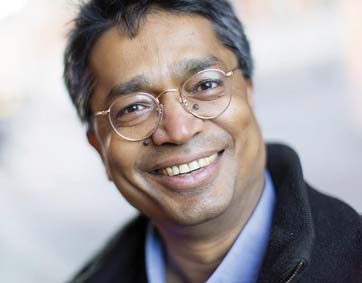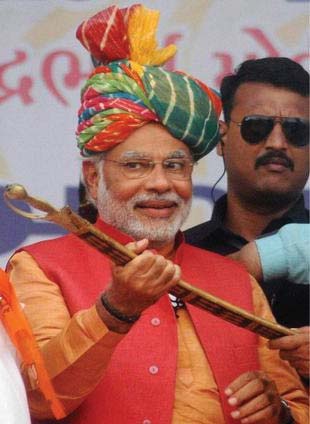It's not what Modi is saying about Muslims, it's why he shouldn't say it at all
Many were expecting him to change his 'Hindutva' spots after becoming PM, but RSS teachings seem more powerful.

Prime Minister Narendra Modi, while addressing an election rally in UP's Fatehpur on February 19, 2017, charged the state's Akhilesh Yadav government for religion-based discriminatory policies.
“If you create a kabristaan (graveyard) in a village, then a shamshaan (cremation ground) should be created. If electricity is given uninterrupted in Ramzan, then it should be given in Diwali without a break. There should be no discrimination... bhed bhaav nahin hona chahiye,” he said.
There is nothing wrong if the PM of the country asks the chief minister of a state to not pursue discriminatory policies on the basis of religion. However, when a leader like Modi makes this kabirstaan-shamshaan and Ramzan-Diwali statement, it is nothing but openly playing dangerous Hindutva politics. The reason is that it is not always what is said, but who says it.
If any president of the US would say that his administration is committed to improving the relationship with Russia, probably he (as it has always been a he) will be a strong candidate to get the Nobel peace prize. But when Donald Trump says it, questions are being raised about his motives. Similarly, Modi suffers from a huge trust deficit, particularly on issues related to minorities.
Modi draws his ideological mooring from the RSS, which he had joined at aged 21. His Hindutva education forces him to see India and Hindus as synonymous and any non-Hindu as "the other". The demagogue Modi is a Hindutva devotee and he continues to unnerve India's minority population, particularly the 180-million strong Muslim community.
A full-time RSS pracharak, Modi became CM of Gujarat in 2001, and within a few months, the state witnessed a pogrom against Muslims. Since then, Modi has been regularly accused of complicity, or at minimum, for miserably failing to maintain law and order.
What was the extent of his culpability can be a matter of judicial scrutiny, but in the eyes of Muslims, he is the culprit. Moreover, in India, no political leader other than Modi has made a robust political career out of a terrible religious riot.
India has witnessed many religious riots, but the political leadership under whose watch the riot took place has always tried to distance itself from it. But not in the case of Modi. He has never apologised for the 2002 massacre, rather he has used the criticism against his role in the riot as a badge of honour to mobilise his support base.
Immediately after the riot, instead of assuaging the fear among the Muslims in Gujarat, CM Modi went on a Gaurav Yatra and attacked Muslims in many inflammatory speeches for his 2002 election campaign.
He had also used the Ramzan analogy then to target Muslims. The Congress had criticised him for transferring Narmada water to Sabarmati river in the Hindu religious month of Shravan for political gains. Modi's riposte to the Congress was: "When you come to power, you are free to bring water during Ramzan."
In that highly surcharged 2002 election campaign, Modi had also openly boasted of his refusal to run relief camps for riot-affected Muslims, alleging that they would become their baby-producing centres - "we are five and we will have 25 offspring (hum paanch, humare pachees)".
As CM of Gujarat from 2001 to 2014, Modi had done whatever possible to strengthen the Hindu-Muslim divide in the state. Raking up Hindutva was always the most dependable election strategy for Modi when competition got tough. Even in the 2012 Assembly election, he used it to win the Gujarat election for the third time in a row.
Modi's mantra of communal polarisation, which helps him electorally, is at the same time dangerously widening the gulf between India's Muslims and their PM. (Photo: Reuters) When Keshubhai Patel threatened to dent the BJP votebank, Modi gave speech after speech saying that the secret candidate of the Congress for the CM post was Ahmed-miyan (Ahmed Patel, political secretary of the Congress president).
Similarly, Modi also repeatedly called former Pakistan president Pervez Musharraf as miyan-Musharraf in the 2007 election. In that election, he was highlighting the threat of Islamic terror in Gujarat emanating from Pakistan.
By attaching the miyan-suffix to Musharraf in 2007 and to Ahmed Patel in 2012, Modi was referring to the larger Muslim population of the state for mobilising support from his Hindutva supporters.
It is true that after the Gujarat riot, Modi has been successful in propagating the myth of "development" in Gujarat. In his campaign for the 2014 general election, though the dominant perception has been that he fought on the issue of development, the truth is that he also played the communal card quite effectively.
While he left his Man Friday Amit Shah to brag about taking revenge for the Muzaffarnagar riot, Modi himself accused the Congress for promoting the "pink revolution", referring to the flourishing beef industry in the country and linking it to the Muslim community. He also openly threatened to deport Bangla-speaking Muslims from Assam.

After Modi became PM in May 2014, the Hindutva forces have been regularly mocking at India's secular Constitution. Muslims have witnessed increased attacks on their places of worship, state patronage has been given for the large-scale ghar wapsi programme and vigilantism has risen against the so-called love-jihad along with Modi himself talking about banning the so-called "triple talaq".
Across India, there have been increasing reports of violence involving gau rakshaks. In September 2015, a Muslim in Dadri village near Delhi was lynched to death for allegedly storing beef in his freezer. In the summer months of 2016, the growing barbaric acts of these cow vigilantes drew international condemnation and that forced Modi to rebuke them.
While doing so, the ever pracharak Modi, to keep his core-support base happy, also managed to invoke a Hindutva version of history, of how Muslim rulers in the past (badshahs) cunningly used cowherds in front of their invading army to win against cow-worshipping Hindu rulers (rajas).
As PM of his country, it was expected that Modi will respect his constitutional obligations and to do whatever he can to protect all faiths in a "secular" India. But, time and again he makes statements that directly or indirectly make the Muslim community nervous.
He left no stone unturned to communalise the Bihar election in 2015, while accusing the opposition without any foundation that they had been trying to "steal" 5 per cent quota to give to a religious minority (read Muslims).
This kabirstaan-shamshaan and Ramzan-Diwali provocation in UP follows the same pattern that Modi has been following since his first entry into electoral politics in 2002.
Modi's mantra of communal polarisation, which helps him electorally, is at the same time dangerously widening the gulf between India's Muslims and their PM. Many were expecting Modi to change his "Hindutva" spots after becoming PM of a diverse country like India, but RSS teachings seem to be more powerful than the demands of the country's Constitution.
Unfortunately, Prime Minister Modi's repeated barb against Muslims has strengthened Hindutva forces in the country and anti-Muslim frenzy has captured the majority imagination.

 1.408.254.0954
1.408.254.0954




